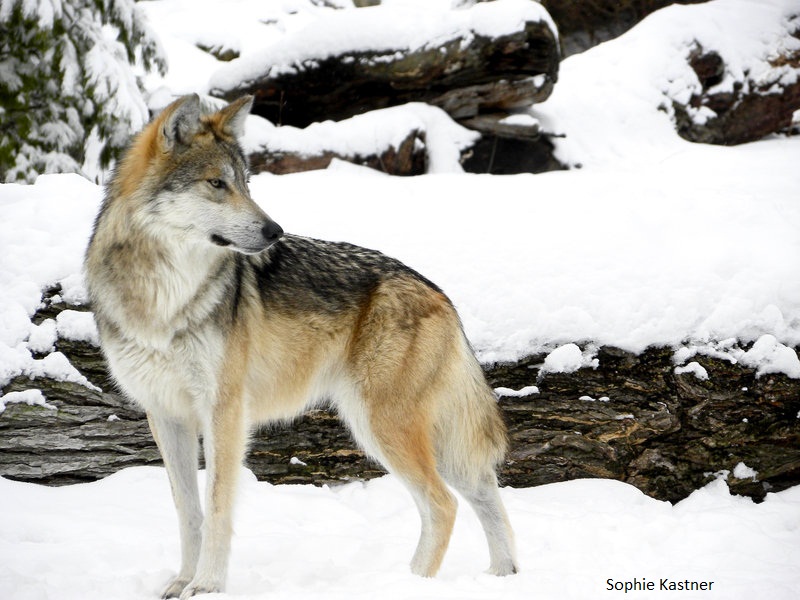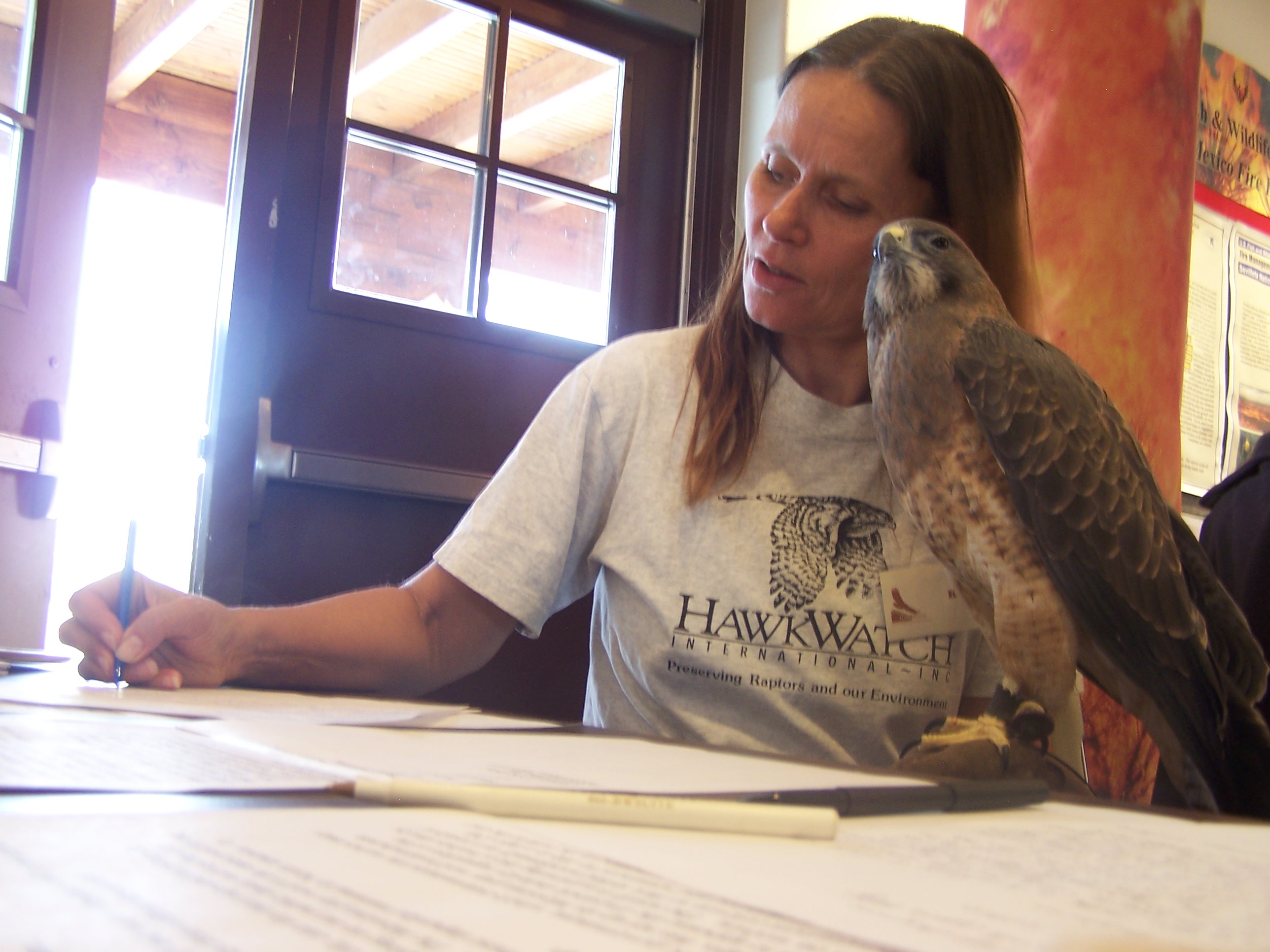In the News: State Game Commission wants new federal plan for wolves ahead of any releases
 By Staci Matlock
By Staci Matlock
The New Mexico State Game Commission has said it doesn’t want more captive Mexican wolves released until the U.S. Fish and Wildlife Service has an updated recovery plan for the endangered species.
The commission’s stance doesn’t bode well for an appeal by Ted Turner’s staff at the Ladder Ranch to continue importing and housing captive Mexican wolves at a facility there. Game and Fish Director Alexa Sandoval denied a permit for the facility, and on Thursday, Nov. 19, the State Game Commission will consider the ranch’s appeal at a public meeting in Roswell.
The 156,439-acre Ladder Ranch west of Ruidoso has provided critical space since 1997 to prepare captive-reared Mexican wolves for release into the wilds of the designated wolf recovery area around the Gila Mountains as part of a federal effort to recover the endangered species.
Sandoval earlier in the year also denied a permit for the U.S. Fish and Wildlife Service to release captive-bred wolf cubs and a pair of adults. The agency appealed the decision, but the State Game Commission backed Sandoval on Sept. 29 and denied the permit as well.
Officials with the federal agency said after the decision that they didn’t legally need a state permit and will proceed with wolf releases next year. Biologists with the federal wolf recovery program say those releases are critical to diversifying the gene pool among the wild wolves and building a lobo population that is viable for the long term.
At Thursday’s meeting in Roswell, the commission also will discuss a lawsuit filed by Arizona against Secretary of the Interior Sally Jewell over the Mexican wolf reintroduction program. Arizona filed the lawsuit in June saying Jewell and the Fish and Wildlife Service have failed to update a Mexican wolf recovery plan as required under the Endangered Species Act. Arizona also contends the federal government has usurped the state’s rights in managing the wolf population.
New Mexico game commissioners could vote to join the Arizona lawsuit. Sandoval and the State Game Commission have argued similar points in denying the permits for the Mexican wolf releases, saying the federal government has failed to revise its old recovery plan for the species.
Conservation groups including the Center for Biological Diversity and Defenders of Wildlife filed a similar lawsuit in 2014, calling on the federal government to complete an updated recovery plan. Michael Robinson, of the Center for Biological Diversity said he thinks the states want to have some control over what’s contained in the recovery plan, and that it won’t be to benefit the wolves.
The Mexican wolf is federally listed as an endangered subspecies of gray wolf. It was considered extinct by the 1970s, killed off by ranchers and hunters. Biologists in New Mexico and Arizona have rebuilt the number of wolves in the wild from seven adults and a few released from captive facilities such as the Ladder Ranch. Biologists counted 110 wolves in the wild this year.
Arizona and New Mexico game officials have argued the Fish and Wildlife Service is operating off a 1982 recovery plan that calls for protecting the captive wolf population and increasing the number of wolves to “at least” 100 in the wild.
Game commissioners say the federal agency must have a recovery plan with an end goal in mind if the wolf is to ever be “recovered” and removed from the endangered species list.
The dispute over the wolf recovery program gets heated in ranch-friendly Catron County, where some of the wild wolves roam. Catron County’s three commissioners are on record opposing more wolf releases and think the State Game Commission has made the right moves in denying permits.
“The citizens of the county and the public in general have the right to know what the new goals of the program are,” said Catron County Commissioner Anita Hand. “I expect the federal agency to set forth clear and concise goals and be transparent and open in setting those goals. It is fundamentally unfair for the USFWS to ask the state Game and Fish Department for a permit to release wolves for a program that is now ambiguous and it has expanded beyond own stated objectives.”
Wolf advocates believe the seven-member commission, appointed by Republican Gov. Susana Martinez, is placating ranchers in the wolf recovery area who say the animals threaten their livestock and their families.
Wolf advocates and federal wolf biologists note the 1982 plan also calls for a “viable” population of Mexican wolves on 5,000 square miles of their historic range. The gene pool of the current wolf population is limited, and biologists are already seeing the impacts in fewer pups born and fewer living to adulthood, a result of inbreeding, according to Michael Robinson of the Center for Biological Diversity.
“When game commissioners say there’s no recovery plan, they are just grasping for a rationale that is an excuse to block wolf recovery,” Robinson said.
There must be enough breeding pairs of wolves spread across a wide geographic area for the wolves to remain viable in the years ahead. There were eight breeding pairs of wolves in 2014, five of the pairs in New Mexico, according to John Oakleaf, Mexican Wolf Field Projects Coordinator for the Fish and Wildlife Service in an email.
Robinson acknowledges the Fish and Wildlife Service has three times tried to finish a recovery plan and failed. He was part of the second attempt, when a team met for two years and had a draft recovery plan by 2005.
The Fish and Wildlife Service says it is working on a recovery plan now and expects to complete it by 2017. Defining how many breeding pairs are needed across how much land will be two important questions for the recovery plan to answer, Oakleaf said.
Hand said this year alone, there have been 36 livestock deaths by wolves, according to reports investigated by the county and USDA. Two injured cows and five injured pets also were blamed on wolves, and people have reported five “close contacts” with wolves. Two people said they had wolves charge at them. The reports are filed with the U.S. Department of Agriculture, Hand said.
This article was published in the Santa Fe New Mexican.

The letters to the editor page is one of the most widely read, influential parts of the newspaper. One letter from you can reach thousands of people and will also likely be read by decision-makers. Tips and talking points for writing your letter are below, but please write in your own words, from your own experience.
Submit your letter to the Santa Fe New Mexican here.
Talking points
- At last official count, only 110 Mexican gray wolves were found in the wild, making them one of the most endangered wolves in the world. Actions such as NM Game Commission’s unwarranted denial of the Ladder Ranch permit will only further complicate efforts to recover these rare wolves.
- The actions of Governor Martinez’s Game Commission to prevent the recovery of Mexican gray wolves are irresponsible and violate the public trust.
- The wild population of Mexican wolves suffers from declining genetic health, resulting from too many removals and too few releases from the captive breeding population. These endangered wolves can’t wait – more wolves must be released into the wild as soon as possible.
- Wolves are responsible for less than one half of one percent of cattle losses in New Mexico. Livestock growers are compensated for losses due to wolves and receive assistance to implement responsible coexistence measures.
- Ladder Ranch has been an important partner in the Mexican wolf reintroduction since 1997. Its valuable participation in this program should not be ended to serve a narrow political agenda.
- The New Mexico Game Commission, under Governor Martinez, has clearly become a tool of a small anti-wolf minority and its actions are out of touch with the majority of New Mexico voters who support wolf recovery and understand the important role top carnivores play in our ecosystems.
- Wolves are a benefit to the West and are essential to restoring the balance of nature. Actions to interfere with the Mexican gray wolf’s survival and recovery cheat us all of the opportunity to have wolves returned to their critical natural role.
- Mexican gray wolves are unique native animals. They are the rarest, most genetically distinct subspecies of gray wolf in North America. State and federal agencies should do all in their power to move these special wolves away from extinction towards recovery. Instead, Martinez’s Game Commission has chosen play politics with the wolves’ future.
- Wolves generate economic benefits – a University of Montana study found that visitors who come to see wolves in Yellowstone contribute roughly $35.5 million annually to the regional economy. New Mexico stands to benefit from wolf-related tourism, but only if the Mexican wolf reintroduction is allowed to succeed.
Letter Writing Tips
Make sure you:
- Thank the paper for this excellent article and make sure to reference the article in your letter.
- Submit your letter as soon as possible. The chance of your letter being published declines after a day or two since the article was published.
- Do not repeat any negative messages, such as “so and so said that wolves kill too many cows, but”¦” Remember that those reading your letter will not be looking at the article it responds to, so this is an opportunity to get out positive messages about wolf recovery rather than to argue with the original article.
- Keep your letter brief, no more than 200 words. Letters will be edited for space and clarity.
- Include something about who you are and why you care: E.g. “I am a mother, outdoors person, teacher, business owner, scientific, religious, etc.” Don’t be afraid to be personal and creative.
- Provide your name, address, phone number and address. The paper won’t publish these, but they want to know you are who you say you are.
_______________________________________________________________________________________________________



